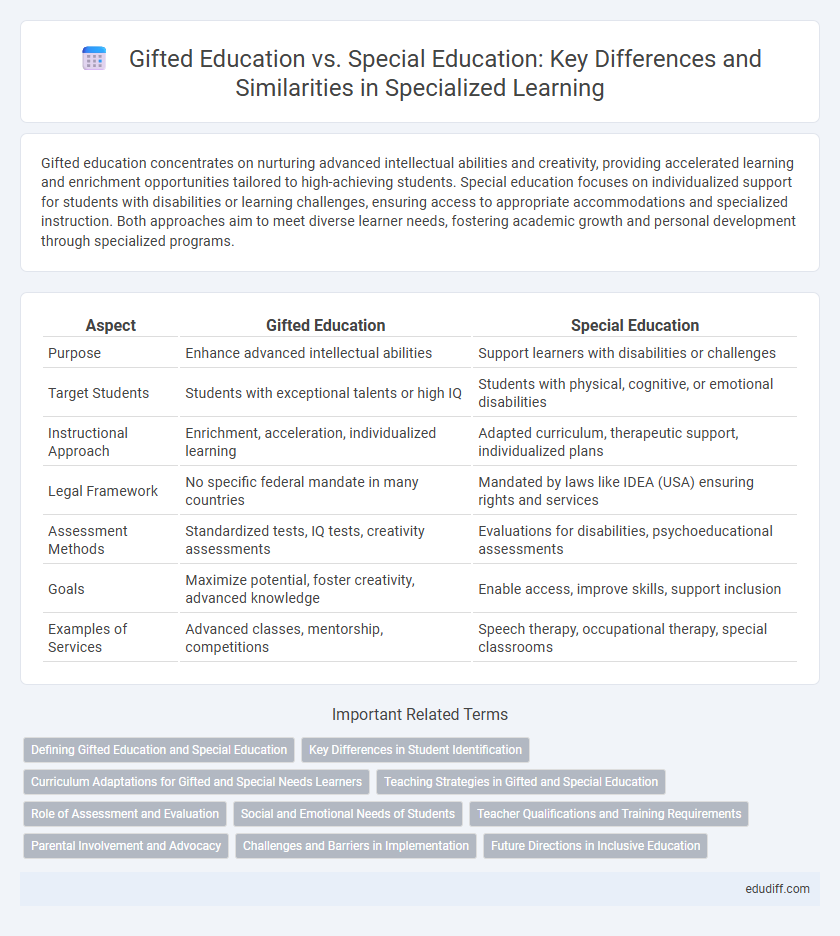Gifted education concentrates on nurturing advanced intellectual abilities and creativity, providing accelerated learning and enrichment opportunities tailored to high-achieving students. Special education focuses on individualized support for students with disabilities or learning challenges, ensuring access to appropriate accommodations and specialized instruction. Both approaches aim to meet diverse learner needs, fostering academic growth and personal development through specialized programs.
Table of Comparison
| Aspect | Gifted Education | Special Education |
|---|---|---|
| Purpose | Enhance advanced intellectual abilities | Support learners with disabilities or challenges |
| Target Students | Students with exceptional talents or high IQ | Students with physical, cognitive, or emotional disabilities |
| Instructional Approach | Enrichment, acceleration, individualized learning | Adapted curriculum, therapeutic support, individualized plans |
| Legal Framework | No specific federal mandate in many countries | Mandated by laws like IDEA (USA) ensuring rights and services |
| Assessment Methods | Standardized tests, IQ tests, creativity assessments | Evaluations for disabilities, psychoeducational assessments |
| Goals | Maximize potential, foster creativity, advanced knowledge | Enable access, improve skills, support inclusion |
| Examples of Services | Advanced classes, mentorship, competitions | Speech therapy, occupational therapy, special classrooms |
Defining Gifted Education and Special Education
Gifted Education addresses the needs of students with exceptional intellectual abilities or talents, emphasizing advanced curriculum and enrichment opportunities to foster their potential. Special Education focuses on supporting students with disabilities or learning challenges through tailored instructional strategies, individualized education plans (IEPs), and appropriate accommodations. Both fields aim to provide specialized resources but differ in target populations and educational approaches.
Key Differences in Student Identification
Gifted education primarily identifies students through high intellectual ability, creativity, and exceptional academic performance, often using standardized IQ tests and achievement assessments. Special education targets students with disabilities or learning challenges, identified through evaluations of cognitive, physical, or emotional impairments affecting academic progress. The key difference lies in gifted programs emphasizing advanced capabilities, while special education focuses on addressing barriers to learning and providing tailored support.
Curriculum Adaptations for Gifted and Special Needs Learners
Curriculum adaptations for gifted learners emphasize advanced content, accelerated pacing, and opportunities for independent research to foster critical thinking and creativity. Special needs curriculum adjustments focus on individualized goals, modified instruction methods, and multisensory approaches to support diverse learning disabilities and developmental challenges. Effective educational programs integrate these adaptations to meet the unique cognitive and developmental requirements of both gifted and special needs students.
Teaching Strategies in Gifted and Special Education
Teaching strategies in gifted education prioritize differentiated instruction, acceleration, and enrichment activities tailored to advanced cognitive abilities and creative thinking skills. In special education, evidence-based practices such as individualized education plans (IEPs), multisensory approaches, and positive behavior interventions address diverse learning disabilities and developmental challenges. Both fields emphasize inclusive, student-centered instruction but require distinct methodologies to optimize learning outcomes for gifted and special needs students.
Role of Assessment and Evaluation
Assessment and evaluation in gifted education emphasize identifying exceptional intellectual abilities and talents through standardized tests, performance tasks, and creative problem-solving assessments. Special education assessments focus on diagnosing learning disabilities, developmental delays, and other challenges using individualized education plans (IEPs) and functional behavioral assessments. Both fields rely on data-driven evaluation to tailor instruction, but gifted education promotes enrichment and acceleration, whereas special education prioritizes support and intervention.
Social and Emotional Needs of Students
Gifted Education programs cater to the advanced intellectual abilities of students but often overlook their unique social and emotional challenges, such as heightened sensitivity and asynchronous development. Special Education focuses on diverse learning needs, including emotional and behavioral disorders, providing tailored interventions to support social skills and emotional regulation. Addressing the social and emotional needs in both Gifted and Special Education is crucial to fostering well-rounded development and preventing issues like anxiety, depression, and social isolation.
Teacher Qualifications and Training Requirements
Teacher qualifications for gifted education typically include specialized certification in gifted and talented pedagogy, emphasizing advanced training in curriculum differentiation and cognitive development. Special education teachers require certification aligned with disability-specific strategies and legal mandates such as the Individuals with Disabilities Education Act (IDEA), focusing on individualized education program (IEP) development and behavioral management techniques. Both fields demand ongoing professional development but diverge in instructional approaches and legal compliance standards tailored to their student populations.
Parental Involvement and Advocacy
Parental involvement in gifted education often centers on nurturing advanced talents and seeking enrichment opportunities, while special education advocacy emphasizes securing individualized support and accommodations for children with disabilities. Parents of gifted students actively advocate for differentiated curricula and acceleration options to challenge their child's abilities. In contrast, parents in special education programs focus on developing and implementing Individualized Education Programs (IEPs) to ensure their child's unique learning needs are met effectively.
Challenges and Barriers in Implementation
Gifted education faces challenges such as identifying diverse talents, ensuring equitable access, and overcoming limited resources and teacher training, which hinders tailored curriculum delivery. Special education encounters barriers including inadequate funding, insufficient staff expertise, and stigma, complicating the provision of individualized support for students with disabilities. Both fields struggle with policy inconsistencies and lack of collaboration between educators and families, impeding effective program implementation.
Future Directions in Inclusive Education
Future directions in inclusive education emphasize personalized learning pathways that integrate both gifted education and special education, fostering equity and accessibility for diverse learners. Advancements in adaptive technology and data-driven assessments enable tailored support, addressing unique cognitive and developmental needs within mainstream classrooms. Collaboration among educators, specialists, and families drives innovative strategies, promoting holistic development and lifelong success for all students.
Gifted Education vs Special Education Infographic

 edudiff.com
edudiff.com